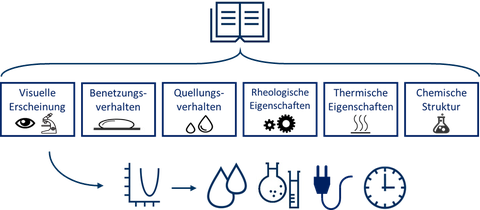SMESA - Standardisierte Methoden für eine industriegerechte Schmutzanalyse in der Lebensmittelproduktion zur ressourcenschonenden Anlagenreinigung
Wirtschaftliche Trends wie die Produktindividualisierung führen zu sinkenden Chargengrößen und somit zu häufigen Produktwechseln auf Maschinen und Anlagen. Durch eine produktspezifische Auslegung der Reinigungsprozesse kann eine Reduktion des Ressourcenverbrauchs hinsichtlich Wasser, Chemie, Energie und Zeit erreicht werden. Hierfür sind Kenntnisse über die reinigungsrelevanten Schmutzeigenschaften notwendig. In Laborversuchen wurden bereits zahlreiche reinigungsrelevante Verschmutzungseigenschaften identifiziert und spezifische Methoden zu deren Analyse etabliert, welche im industriellen Umfeld jedoch nur schwer einsetzbar sind.
Ziel des Projekts ist daher die Bereitstellung eines industriell anwendbaren, standardisierten Methodenkatalogs für die Analyse der reinigungsrelevanten Eigenschaften von Verschmutzungen sowie die zielgerichtete Nutzung der Ergebnisse für die Parametrierung und Optimierung ressourceneffizienter und sicherer Reinigungsprozesse in der Lebensmittelproduktion. Erarbeitet werden einerseits leicht in Laboren von lebensmittelproduzierenden Unternehmen umzusetzende Methoden sowie eine Auswahl an Methoden, die mittels Auftragsanalytik erfolgen können.
Auf Grundlage bisheriger Forschungsergebnisse sowie einer Unternehmensbefragung werden Methoden zur zielgerichteten Bestimmung reinigungsrelevanter Schmutzeigenschaften gesammelt. An beispielhaften Verschmutzungen aus der Molkereibranche werden diese anschließend im Labor und Technikumsmaßstab etabliert und validiert. Es erfolgt eine Einordnung hinsichtlich ihrer Potenziale, Aussagekraft und industriellen Umsetzbarkeit. Zusammenhänge werden mit Hilfe statistischer Auswertungen in einem Entscheidungsbaum dargestellt.
Im Ergebnis des Projekts entsteht ein Methodenkatalog, welcher es gestattet, reinigungsrelevante Eigenschaften lebensmittelbasierter Verschmutzungen direkt im industriellen Umfeld zu bestimmen und zu interpretieren. Auf Grundlage der Ergebnisse lassen sich geeignete Reinigungsflüssigkeiten und Reinigungsprozesse schmutzspezifisch auswählen. Der Methodenkatalog stellt damit ein wesentliches Werkzeug für eine bedarfsgerechte Reinigung dar.
Projektfinanzierung:
Gefördert mit den Mitteln der Deutschen Bundesstiftung Umwelt.
Projektlaufzeit:
06.2023-05.2025
Projektleitung und -bearbeitung:
Projektleitung: Prof. Jens-Peter Majschak
Projektmitarbeiter: Dipl.-Ing. Sebastian Kricke
 © Clemens Troll
© Clemens Troll
Reinigungstechnologien
NameDipl.-Ing. Sebastian Kricke
Eine verschlüsselte E-Mail über das SecureMail-Portal versenden (nur für TUD-externe Personen).
Kooperationspartner: Technische Universität Dresden, Institut für Naturstofftechnik, Professur für Lebensmitteltechnik

